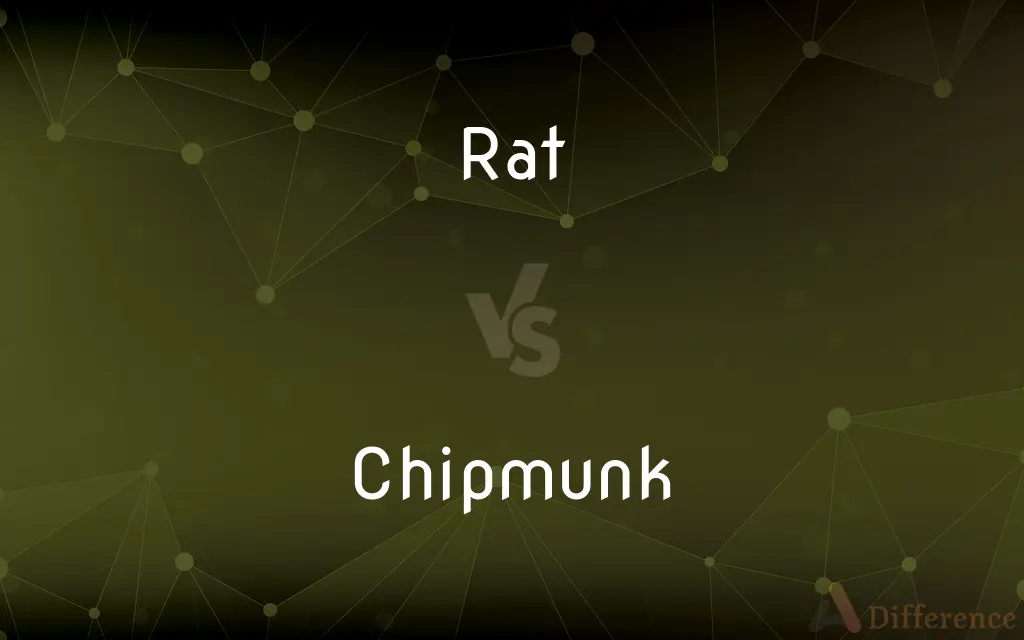Rat vs. Chipmunk — What's the Difference?
By Fiza Rafique & Urooj Arif — Updated on April 2, 2024
Rats are larger rodents known for their adaptability to various environments, often associated with urban settings, while chipmunks are smaller, with distinctive stripes and a preference for wooded areas.

Difference Between Rat and Chipmunk
Table of Contents
ADVERTISEMENT
Key Differences
Rats are versatile rodents that belong to the genus Rattus, with the most common species being the Norway rat (Rattus norvegicus) and the roof rat (Rattus rattus). They are known for their ability to adapt to a wide range of environments, including urban areas, where they often become pests due to their tendency to feed on human waste and damage property. Chipmunks, on the other hand, belong to the family Sciuridae and are part of the genus Tamias. They are small, ground-dwelling rodents known for their distinctive black, white, and brown stripes that run down their backs.
Rats are larger than chipmunks, with some species capable of growing quite large, and they have a reputation for being cunning and resilient. Chipmunks are more commonly found in wooded or forested areas where they have access to their natural diet of seeds, nuts, fruits, and insects. Unlike rats, chipmunks are solitary animals and are known for their habit of storing food in their cheek pouches to transport it to their burrows.
While rats can breed rapidly and have a large number of offspring, which contributes to their success in various environments, chipmunks have smaller litters and do not reproduce as prolifically. This difference in reproductive rate is one reason why rats are more widely spread and can be found in diverse environments around the world.
Rats are often viewed negatively due to their association with disease and pestilence. They can carry a variety of diseases that are transmissible to humans, making them a major concern in urban and rural areas alike. Chipmunks, while they can also carry diseases, are less likely to come into conflict with humans and are often considered cute or charming, especially in popular culture.
The behavior of rats and chipmunks also differs significantly. Rats are more likely to be seen as opportunistic feeders, eating a wide range of foods, including human refuse. Chipmunks, with their preference for seeds and nuts, play an important role in their ecosystems by dispersing seeds and contributing to the health of their habitats.
ADVERTISEMENT
Comparison Chart
Size
Larger, can grow quite large.
Smaller, with a more compact body.
Habitat
Adaptable to various environments, including urban areas.
Prefer wooded or forested areas.
Diet
Opportunistic feeders, can eat a wide range of foods.
Primarily seeds, nuts, fruits, and insects.
Reproduction
Rapid breeders with a large number of offspring.
Smaller litters, do not reproduce as prolifically.
Social Behavior
Can live in large groups, especially in urban areas.
Solitary, except during mating season.
Diseases
Known to carry diseases transmissible to humans.
Less likely to come into conflict with humans, carry fewer diseases.
Compare with Definitions
Rat
A large, adaptable rodent often found in urban areas.
The city has implemented measures to control the rat population.
Chipmunk
A small, striped rodent found in wooded areas.
Chipmunks are common sights in the national park.
Rat
Can be a pest, damaging property and spreading disease.
Rats in the warehouse have been a persistent problem.
Chipmunk
Considered charming and are popular in culture.
Chipmunks have been featured in cartoons and movies.
Rat
Opportunistic feeders that eat a wide range of foods.
Urban rats thrive on human waste.
Chipmunk
Prefers a diet of seeds, nuts, and fruits.
I saw a chipmunk nibbling on a piece of fruit in the garden.
Rat
Lives in large groups called packs.
A pack of rats was seen near the subway tracks.
Chipmunk
Solitary except during mating season.
Chipmunks are rarely seen together, as they prefer to live alone.
Rat
Known for their cunning and resilience.
Rats can survive in almost any environment.
Chipmunk
Known for storing food in their cheek pouches.
The chipmunk filled its cheeks with seeds before scurrying away.
Rat
Rats are various medium-sized, long-tailed rodents. Species of rats are found throughout the order Rodentia, but stereotypical rats are found in the genus Rattus.
Chipmunk
Chipmunks are small, striped rodents of the family Sciuridae. Chipmunks are found in North America, with the exception of the Siberian chipmunk which is found primarily in Asia.
Rat
A rodent that resembles a large mouse, typically having a pointed snout and a long tail. Some kinds have become cosmopolitan and are sometimes responsible for transmitting diseases.
Chipmunk
Any of several small striped rodents of the genus Tamias, chiefly of North America.
Rat
A despicable person, especially a man who has been deceitful or disloyal
Her rat of a husband cheated on her
Chipmunk
A squirrel-like rodent of the genus Tamias, native mainly to North America.
Rat
A person who is associated with or frequents a specified place
LA mall rats
Chipmunk
(transitive) To speed up (an audio recording, especially a song), to make the voices high-pitched.
Rat
A pad used to give shape and fullness to a woman's hair.
Chipmunk
(transitive) To fill (one's mouth or cheeks) with food.
Rat
Used to express mild annoyance or irritation.
Chipmunk
(transitive) To stuff (food) into one's mouth or cheeks, sometimes as part of competitive eating.
Rat
Hunt or kill rats
Ratting is second nature to a Jack Russell
Chipmunk
A squirrel-like animal of the genus Tamias, sometimes called the striped squirrel, chipping squirrel, ground squirrel, hackee. The common species of the United States is the Tamias striatus.
Rat
Desert one's party, side, or cause
Many of the clans rallied to his support, others ratted and joined the King's forces
Chipmunk
Chipmunk of western America and Asia
Rat
Shape (hair) with a rat.
Rat
Any of various long-tailed rodents resembling mice but larger, especially one of the genus Rattus.
Rat
Any of various animals similar to one of these long-tailed rodents.
Rat
A despicable person, especially one who betrays or informs upon associates.
Rat
A scab laborer.
Rat
A pad of material, typically hair, worn as part of a woman's coiffure to puff out her own hair.
Rat
(Slang) A person who frequently passes time at a particular place. Often used in combination
A rink rat.
Rat
To hunt for or catch rats, especially with the aid of dogs.
Rat
(Slang) To reveal incriminating or embarrassing information about someone, especially to a person in authority
Ratted on his best friend to the police.
Rat
(Slang) To work as a scab laborer.
Rat
To puff out (the hair) with or as if with a pad of material.
Rat
(zoology) A medium-sized rodent belonging to the genus Rattus.
Rat
(informal) Any of the numerous members of several rodent families (e.g. voles and mice) that resemble true rats in appearance, usually having a pointy snout, a long, bare tail, and body length greater than about 12 cm, or 5 inches.
Rat
(informal) A person who is known for betrayal; a scoundrel; a quisling.
Rat bastard
What a rat, leaving us stranded here!
Rat
(informal) An informant or snitch.
Rat
(informal) A scab: a worker who acts against trade union policies.
Rat
(slang) A person who routinely spends time at a particular location.
Our teenager has become a mall rat.
He loved hockey and was a devoted rink rat.
Rat
A wad of shed hair used as part of a hairstyle.
Rat
A roll of material used to puff out the hair, which is turned over it.
Rat
Vagina.
Get your rat out.
Rat
(regional) A scratch or a score.
Rat
A place in the sea with rapid currents and crags where a ship is likely to be torn apart in stormy weather.
Rat
(usually with “on” or “out”) To betray a person or party, especially by telling their secret to an authority or an enemy; to turn someone in.
He ratted on his coworker.
He is going to rat us out!
Rat
To work as a scab, going against trade union policies.
Rat
(of a dog, etc.) To kill rats.
Rat
(regional) To scratch or score.
He ratted a vertical line on his face with a pocket knife.
Rat
To tear, rip, rend.
Ratted to shreds.
Rat
Damn, drat, blast; used in oaths.
Rat
One of several species of small rodents of the genus Rattus (formerly included in Mus) and allied genera, of the family Muridae, distinguished from mice primarily by being larger. They infest houses, stores, and ships, especially the Norway rat, also called brown rat, (Rattus norvegicus formerly Mus decumanus), the black rat (Rattus rattus formerly Mus rattus), and the roof rat (formerly Mus Alexandrinus, now included in Rattus rattus). These were introduced into America from the Old World. The white rat used most commonly in laboratories is primarily a strain derived from Rattus rattus.
Rat
A round and tapering mass of hair, or similar material, used by women to support the puffs and rolls of their natural hair.
Rat
One who deserts his party or associates; hence, in the trades, one who works for lower wages than those prescribed by a trades union.
Rat
In English politics, to desert one's party from interested motives; to forsake one's associates for one's own advantage; in the trades, to work for less wages, or on other conditions, than those established by a trades union.
Coleridge . . . incurred the reproach of having ratted, solely by his inability to follow the friends of his early days.
Rat
To catch or kill rats.
Rat
To be an informer (against an associate); to inform (on an associate); to squeal; - used commonly in the phrase to rat on.
Rat
Any of various long-tailed rodents similar to but larger than a mouse
Rat
Someone who works (or provides workers) during a strike
Rat
A person who is deemed to be despicable or contemptible;
Only a rotter would do that
Kill the rat
Throw the bum out
You cowardly little pukes!
The British call a contemptible person a `git'
Rat
One who reveals confidential information in return for money
Rat
A pad (usually made of hair) worn as part of a woman's coiffure
Rat
Desert one's party or group of friends, for example, for one's personal advantage
Rat
Employ scabs or strike breakers in
Rat
Take the place of work of someone on strike
Rat
Give (hair) the appearance of being fuller by using a rat
Rat
Catch rats, especially with dogs
Rat
Give away information about somebody;
He told on his classmate who had cheated on the exam
Common Curiosities
What are the primary differences between rats and chipmunks?
The primary differences include size, habitat preference, diet, social behavior, and public perception, with rats often associated with urban areas and chipmunks with wooded environments.
Do rats and chipmunks have any predators in common?
Yes, both are preyed upon by birds of prey, snakes, and various mammalian predators, depending on their respective habitats.
Why are rats considered pests while chipmunks are not?
Rats are considered pests due to their tendency to feed on human waste, damage property, and spread diseases, while chipmunks are less likely to come into conflict with humans and are often viewed more favorably.
Can rats and chipmunks coexist in the same environment?
While they may share some overlapping territories, their different habitat preferences and diets mean they often occupy different niches within an ecosystem.
How do rats adapt to urban environments?
Rats adapt through their omnivorous diet, reproductive strategies, and ability to find shelter in small and protected areas within human constructions.
How can I tell a rat and a chipmunk apart?
Aside from size, rats and chipmunks can be differentiated by physical markings; chipmunks have distinctive stripes, while rats do not.
What role do chipmunks play in their ecosystem?
Chipmunks contribute to their ecosystems by dispersing seeds and nuts, aiding in forest regeneration and growth.
Can chipmunks be kept as pets?
While chipmunks can be kept as pets in some regions, their wild nature and specific care requirements make them less common as domestic animals compared to more traditional pets.
What measures can be taken to control rat populations in urban areas?
Control measures include sanitation efforts, securing food sources, habitat modification, and, when necessary, the use of traps or poisons, with a focus on humane and environmentally friendly practices.
Are rats or chipmunks more intelligent?
Both species show signs of intelligence, such as problem-solving abilities and social complexity, but rats are often cited for their exceptional adaptability and learning capabilities.
How do rats and chipmunks survive winter?
Rats continue their usual activities in human-modified environments that provide shelter and food. Chipmunks may enter a state of torpor, reducing their metabolic rate, and rely on stored food.
Share Your Discovery

Previous Comparison
Sonnet vs. Villanelle
Next Comparison
Schizont vs. TrophozoiteAuthor Spotlight
Written by
Fiza RafiqueFiza Rafique is a skilled content writer at AskDifference.com, where she meticulously refines and enhances written pieces. Drawing from her vast editorial expertise, Fiza ensures clarity, accuracy, and precision in every article. Passionate about language, she continually seeks to elevate the quality of content for readers worldwide.
Co-written by
Urooj ArifUrooj is a skilled content writer at Ask Difference, known for her exceptional ability to simplify complex topics into engaging and informative content. With a passion for research and a flair for clear, concise writing, she consistently delivers articles that resonate with our diverse audience.













































